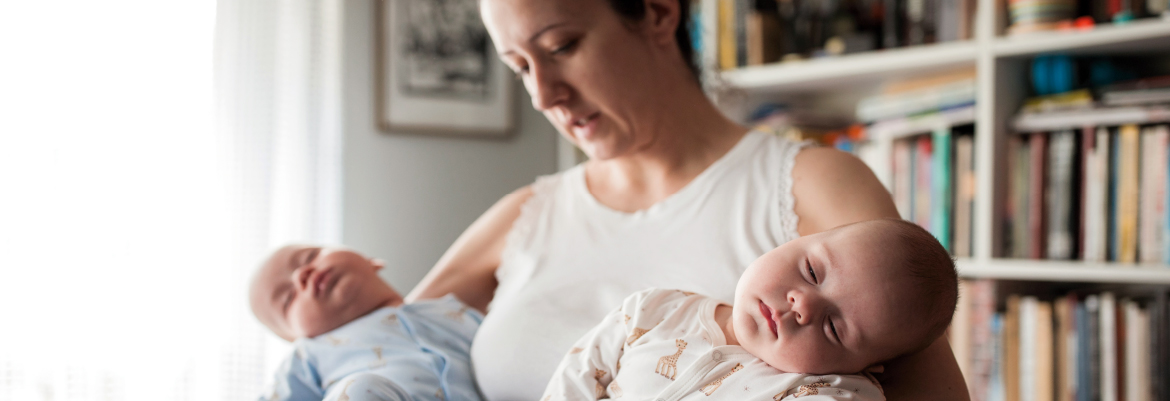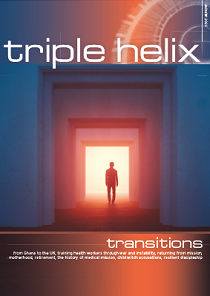How do we, as Christians navigate our shape-shifting identities? Especially working in professions where our jobs can define us. I would like to explore with you three things I have learnt from this latest transition: the emptiness of the world's offers to help you reconnect with yourself, a deeper understanding of my foundational identity as a child of God, and a wonder for God's unconditional love.
Firstly, the emptiness of the world's offers to help you find yourself. In those first few weeks, you put yourself aside to care for your baby, whether that be feeding with cracked, painful nipples, cuddling them back to sleep when you can barely stay awake, or changing a particularly unpleasant nappy when you yourself are unwell. As you suppress your needs, you can lose yourself. Beyond the newborn phase, you remain lower down the priority list - packing for a holiday, your suitcase is packed last after the children's (and in my case, the dog's!), regularly resulting in you forgetting something.
The world's answer is either to embrace it or fight it. The 'embrace it' option involves becoming 'super mum'. Follow these accounts on Instagram to provide your child with excellent sleep and nutritious weaning, or attend these baby classes, which will help you connect with your baby and make new friendships with other mothers. The problem is that these set unrealistic expectations. Instagram and TikTok aren't true representations of motherhood. They are the glossy, edited version of cuddles and cuteness. The baby classes don't lead to the friendships you'd hoped for or become another stressful outing right in the middle of your child's preferred nap time. As a result, you can be left feeling like you are letting your child down.
The 'fight it' solution is to find a fitness class to get your pre-baby body back, get help, and not let your baby stop you from doing the things you love. This leaves you feeling like you are letting yourself down.
In and of themselves, baby classes and getting fit, etc. are not bad things. However, it is a fallacy to suggest that they will answer the questions of 'who am I?' and 'who have I become?'.
This brings me to my second point. As a Christian, the foundational identity I have is as a person made in the image of God. God does not see me any differently now that I have Albert and Theo. I am still his dearly loved daughter. Jesus still died for my sins. My worth is not dependent on being able to get Albert to sleep, or when Theo can sit independently, the boys being non-fussy eaters, how many new friends I have, or when I can run a 5k again. This firm foundation helps me adjust to the new version of myself.
The Bible is full of mothers, but there aren't many stories exploring the challenges of motherhood. You see fleeting glances - the prostitute who would rather give up her baby than see it shared (1 Kings 3:16-28); Hannah who, on having her prayer answered for a son, offers Samuel back to the Lord (1 Samuel 1:28); and women pleading with prophets and Jesus to heal their children (for example, 2 Kings 4:18-37 and Matthew 19:13-15). In these stories, you see God's love for the women involved. God sees the individual and answers their prayers. In the same way, he sees each and every mother and the challenges and joys that they face. He rejoices with those rejoicing and weeps with those weeping. God is present and hears my prayers, whether it be at 3 am or 3 pm. Thankfully, the Spirit intercedes when I'm too tired or frustrated to find the right words. With God's strength, I can accept my fragility.
Finally, I have a new sense of awe at God's unconditional love for us. The boys were born six weeks early. Thankfully they didn't need to spend any time in NICU (Neonatal Intensive Care Unit) and so came home at five days old. However, this early arrival meant that we had a prolonged newborn phase. They didn't learn to smile until twelve weeks, had tiny stomachs, were slow feeders, and wanted to be held all the time. Towards the end of this season, I was desperate for some sort of acknowledgement from them that they appreciated all that I was doing for them. Now, when they smile at me, my heart melts. Those first few weeks are a metaphor for God's experience of loving us. He showers us with good gifts, and for much of our lives, we don't acknowledge him. He even sent his Son to die for us whilst we were still sinners, which now I have my own sons, is even more overwhelming. Then when we look up and smile at him to say thank you, there is a celebration in heaven. I struggled to love my boys unconditionally for twelve weeks - God loved me for years before I smiled at him.
God's love for us is costly, not just because Christ died for us, but because it is so one-sided. Having my own children is slowly developing my understanding of what it means for God to choose to be 'our Father' rather than simply our King or Deity. It carries a level of personal cost at the pain of rejection, as well as a need for endless patience as we do another silly thing requiring forgiveness.
In summary, my understanding of who I am as a child of God continues to evolve as new facets of my calling are exposed. The foundation I have in Christ gives me reassurance that I can weather life's storms. As I transition into motherhood and my understanding of this facet of my identity evolves, so does my understanding of what it means for God to be Father.
Alice Gerth is an anaesthetics registrar and a member of the Triple Helix editorial committee
































